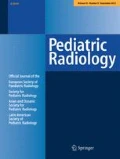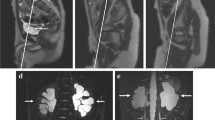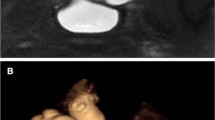Abstract
MR urography represents the next step in the evolution of uroradiology in children by combining superb anatomic imaging with quantitative functional evaluation in a single examination that does not use ionizing radiation. MR imaging has inherently greater soft-tissue contrast than other imaging techniques. When used in conjunction with dynamic scanning after administration of a contrast agent, it provides non-invasive analysis of the perfusion, concentration and excretion of each kidney. The purpose of this review is to outline our experience with more than 500 MR urograms in children. We outline our technique in detail, showing how we calculate differential renal function and how we assess concentration and excretion in the different regions of the kidney. We show that the dynamic contrast-enhanced data can be processed to yield quantitative measures of individual kidney GFR. In the clinical section we show how MR urography adds unique aspects to the anatomic evaluation of the urinary tract, and by combining the anatomic information with functional information, how we assess hydronephrosis and obstructive uropathy, congenital malformations, pyelonephritis and renal scarring.














Similar content being viewed by others
References
Grattan-Smith JD, Perez-Bayfield MR, Jones RA, et al (2003) MR imaging of kidneys: functional evaluation using F-15 perfusion imaging. Pediatr Radiol 33:293–304
Jones RA, Easley K, Little SB, et al (2005) Dynamic contrast-enhanced MR urography in the evaluation of pediatric hydronephrosis: part 1 functional assessment. AJR 185:1598–1607
Jones RA, Perez-Brayfield MR, Kirsch AJ, et al (2004) Renal transit time with MR urography in children. Radiology 233:41–50
McDaniel BB, Jones RA, Scherz H, et al (2005) Dynamic contrast-enhanced MR urography in the evaluation of pediatric hydronephrosis: part 2 anatomic and functional assessment of uteropelvic junction obstruction. AJR 185:1608–1614
Perez-Brayfield MR, Kirsch AJ, Jones RA, et al (2003) A prospective study comparing ultrasound, nuclear scintigraphy and dynamic contrast enhanced magnetic resonance imaging in the evaluation of hydronephrosis. J Urol 170:1330–1334
Avni EF, Bali MA, Regnault M, et al (2002) MR urography in children. Eur J Radiol 43:154–166
Borthne A, Nordshus T, Reiseter T, et al (1999) MR urography: the future gold standard in paediatric urogenital imaging? Pediatr Radiol 29:694–701
Borthne A, Pierre-Jerome C, Nordshus T, et al (2000) MR urography in children: current status and future development. Eur Radiol 10:503–511
Nolte-Ernsting CC, Adam GB, Gunther RW (2001) MR urography: examination techniques and clinical applications. Eur Radiol 11:355–372
Riccabona M (2004) Pediatric MRU—its potential and its role in the diagnostic work-up of upper urinary tract dilatation in infants and children. World J Urol 22:79–87
Riccabona M, Riccabona M, Koen M, et al (2004) Magnetic resonance urography: a new gold standard for the evaluation of solitary kidneys and renal buds? J Urol 171:1642–1646
Riccabona M, Ruppert-Kohlmayr A, Ring E, et al (2004) Potential impact of pediatric MR urography on the imaging algorithm in patients with a functional single kidney. AJR 183:795–800
Rohrschneider WK, Becker K, Hoffend J, et al (2000) Combined static-dynamic MR urography for the simultaneous evaluation of morphology and function in urinary tract obstruction. II. Findings in experimentally induced ureteric stenosis. Pediatr Radiol 30:523–532
Rohrschneider WK, Haufe S, Clorius JH, et al (2003) MR to assess renal function in children. Eur Radiol 13:1033–1045
Rohrschneider WK, Haufe S, Wiesel M, et al (2002) Functional and morphologic evaluation of congenital urinary tract dilatation by using combined static-dynamic MR urography: findings in kidneys with a single collecting system. Radiology 224:683–694
Rohrschneider WK, Hoffend J, Becker K, et al (2000) Combined static-dynamic MR urography for the simultaneous evaluation of morphology and function in urinary tract obstruction. I. Evaluation of the normal status in an animal model. Pediatr Radiol 30:511–522
Brown SC, Upsdell SM, O’Reilly PH (1992) The importance of renal function in the interpretation of diuresis renography. Br J Urol 69:121–125
Goodman LS, Gilman A, Gilman AG (1990) The pharmacological basis of therapeutics. Pergamon Press, New York
Huang AJ, Lee VS, Rusinek H (2004) Functional renal MR imaging. Magn Reson Imaging Clin N Am 12:469–486, vi
Lee VS, Rusinek H, Noz ME, et al (2003) Dynamic three-dimensional MR renography for the measurement of single kidney function: initial experience. Radiology 227:289–294
Taylor J, Summers PE, Keevil SF, et al (1997) Magnetic resonance renography: optimisation of pulse sequence parameters and Gd-DTPA dose, and comparison with radionuclide renography. Magn Reson Imaging 15:637–649
The HS, Ang ES, Wong WC, et al (2003) MR renography using a dynamic gradient-echo sequence and low-dose gadopentetate dimeglumine as an alternative to radionuclide renography. AJR 181:441–450
Heuer R, Sommer G, Shortliffe LD (2003) Evaluation of renal growth by magnetic resonance imaging and computerized tomography volumes. J Urol 170:1659–1663; discussion 1663
van den Dool SW, Wasser MN, de Fijter JW, et al (2005) Functional renal volume: quantitative analysis at gadolinium-enhanced MR angiography—feasibility study in healthy potential kidney donors. Radiology 236:189–195
Bakker J, Olree M, Kaatee R, et al (1999) Renal volume measurements: accuracy and repeatability of US compared with that of MR imaging. Radiology 211:623–628
Krier JD, Ritman EL, Bajzer Z, et al (2001) Noninvasive measurement of concurrent single-kidney perfusion, glomerular filtration, and tubular function. Am J Physiol Renal Physiol 281:F630–F638
Hackstein N, Heckrodt J, Rau WS (2003) Measurement of single-kidney glomerular filtration rate using a contrast-enhanced dynamic gradient-echo sequence and the Rutland-Patlak plot technique. J Magn Reson Imaging 18:714–725
Rutland MD (1979) A single injection technique for subtraction of blood background in 131I-hippuran renograms. Br J Radiol 52:134–137
Patlak CS, Blasberg RG, Fenstermacher JD (1983) Graphical evaluation of blood-to-brain transfer constants from multiple-time uptake data. J Cereb Blood Flow Metab 3:1–7
Peters AM (1994) Graphical analysis of dynamic data: the Patlak-Rutland plot. Nucl Med Commun 15:669–672
Hackstein N, Kooijman H, Tomaselli S, et al (2005) Glomerular filtration rate measured using the Patlak plot technique and contrast-enhanced dynamic MRI with different amounts of gadolinium-DTPA. J Magn Reson Imaging 22:406–414
Pennington DJ, Lonergan GJ, Flack CE, et al (1996) Experimental pyelonephritis in piglets: diagnosis with MR imaging. Radiology 201:199–205
Rusinek H, Lee VS, Johnson G (2001) Optimal dose of Gd-DTPA in dynamic MR studies. Magn Reson Med 46:312–316
Csaicsich D, Greenbaum LA, Aufricht C (2004) Upper urinary tract: when is obstruction obstruction? Curr Opin Urol 14:213–217
Eskild-Jensen A, Gordon I, Piepsz A, et al (2005) Congenital unilateral hydronephrosis: a review of the impact of diuretic renography on clinical treatment. J Urol 173:1471–1476
Peters CA (1995) Urinary tract obstruction in children. J Urol 154:1874–1883; discussion 1883–1884
O’Reilly PH (2002) Obstructive uropathy. Q J Nucl Med 46:295–303
Klahr S (2001) Urinary tract obstruction. Semin Nephrol 21:133–145
Wen JG, Frokiaer J, Jorgensen TM, et al (1999) Obstructive nephropathy: an update of the experimental research. Urol Res 27:29–39
Koff SA, Binkovitz L, Coley B, et al (2005) Renal pelvis volume during diuresis in children with hydronephrosis: implications for diagnosing obstruction with diuretic renography. J Urol 174:303–307
Smith BG, Metwalli AR, Leach J, et al (2004) Congenital midureteral stricture in children diagnosed with antenatal hydronephrosis. Urology 64:1014–1019
Avni FE, Nicaise N, Hall M, et al (2001) The role of MR imaging for the assessment of complicated duplex kidneys in children: preliminary report. Pediatr Radiol 31:215–223
Hellstrom M, Hjalmas K, Jacobsson B, et al (1985) Normal ureteral diameter in infancy and childhood. Acta Radiol Diagn (Stockh) 26:433–439
Campbell MF, Walsh PC, Retik AB (2002) Campbell’s urology. Saunders, Philadelphia
Ichikawa I, Kuwayama F, Pope JC 4th, et al (2002) Paradigm shift from classic anatomic theories to contemporary cell biological views of CAKUT. Kidney Int 61:889–898
Mackie GG, Stephens FD (1975) Duplex kidneys: a correlation of renal dysplasia with position of the ureteral orifice. J Urol 114:274–280
Pope JC 4th, Brock JW 3rd, Adams MC, et al (1999) How they begin and how they end: classic and new theories for the development and deterioration of congenital anomalies of the kidney and urinary tract, CAKUT. J Am Soc Nephrol 10:2018–2028
Glassberg KI, Stephens FD, Lebowitz RL, et al (1987) Renal dysgenesis and cystic disease of the kidney: a report of the Committee on Terminology, Nomenclature and Classification, Section on Urology, American Academy of Pediatrics. J Urol 138:1085–1092
Stock JA, Wilson D, Hanna MK (1998) Congenital reflux nephropathy and severe unilateral fetal reflux. J Urol 160:1017–1018
Anderson PA, Rickwood AM (1991) Features of primary vesicoureteric reflux detected by prenatal sonography. Br J Urol 67:267–271
Najmaldin A, Burge DM, Atwell JD (1990) Reflux nephropathy secondary to intrauterine vesicoureteric reflux. J Pediatr Surg 25:387–390
Yeung CK, Godley ML, Dhillon HK, et al (1997) The characteristics of primary vesico-ureteric reflux in male and female infants with pre-natal hydronephrosis. Br J Urol 80:319–327
Polito C, La Manna A, Rambaldi PF, et al (2000) High incidence of a generally small kidney and primary vesicoureteral reflux. J Urol 164:479–482
Risdon RA (1993) The small scarred kidney in childhood. Pediatr Nephrol 7:361–364
Kavanagh EC, Ryan S, Awan A, et al (2005) Can MRI replace DMSA in the detection of renal parenchymal defects in children with urinary tract infections? Pediatr Radiol 35:275–281
Lonergan GJ, Pennington DJ, Morrison JC, et al (1998) Childhood pyelonephritis: comparison of gadolinium-enhanced MR imaging and renal cortical scintigraphy for diagnosis. Radiology 207:377–384
Weiser AC, Amukele SA, Leonidas JC, et al (2003) The role of gadolinium enhanced magnetic resonance imaging for children with suspected acute pyelonephritis. J Urol 169:2308–2311
Montet X, Ivancevic MK, Belenger J, et al (2003) Noninvasive measurement of absolute renal perfusion by contrast medium-enhanced magnetic resonance imaging. Invest Radiol 38:584–592
Prasad PV, Chen Q, Goldfarb JW, et al (1997) Breath-hold R2* mapping with a multiple gradient-recalled echo sequence: application to the evaluation of intrarenal oxygenation. J Magn Reson Imaging 7:1163–1165
Prasad PV, Edelman RR, Epstein FH (1996) Noninvasive evaluation of intrarenal oxygenation with BOLD MRI. Circulation 94:3271–3275
Grenier N, Basseau F, Ries M, et al (2003) Functional MRI of the kidney. Abdom Imaging 28:164–175
Ries M, Basseau F, Tyndal B, et al (2003) Renal diffusion and BOLD MRI in experimental diabetic nephropathy. Blood oxygen level-dependent. J Magn Reson Imag 17:104–113
Muller MF, Prasad PV, Bimmler D, et al (1994) Functional imaging of the kidney by means of measurement of the apparent diffusion coefficient. Radiology 193:711–715
Yamada I, Aung W, Himeno Y, et al (1999) Diffusion coefficients in abdominal organs and hepatic lesions: evaluation with intravoxel incoherent motion echo-planar MR imaging. Radiology 210:617–623
Ries M, Jones RA, Basseau F, et al (2001) Diffusion tensor MRI of the human kidney. J Magn Reson Imag 14:42–49
Author information
Authors and Affiliations
Corresponding author
Rights and permissions
About this article
Cite this article
Grattan-Smith, J.D., Jones, R.A. MR urography in children. Pediatr Radiol 36, 1119–1132 (2006). https://doi.org/10.1007/s00247-006-0222-2
Received:
Revised:
Accepted:
Published:
Issue Date:
DOI: https://doi.org/10.1007/s00247-006-0222-2




